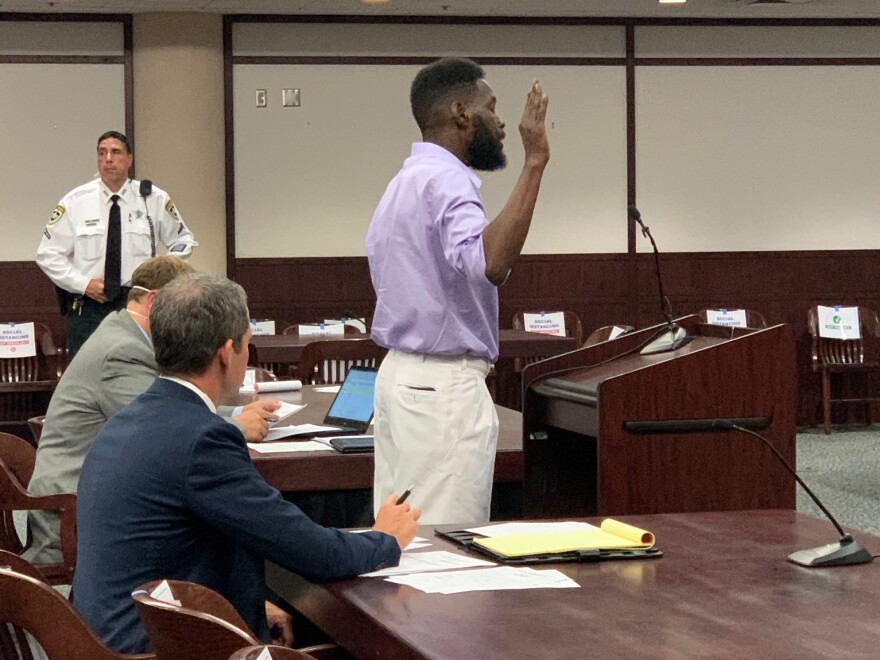A group of Hillsborough County residents who served time for felony convictions but can’t afford to pay outstanding fines and court fees had their voting rights restored on Tuesday.
Judge Catherine M. Catlin of Florida’s 13th Circuit Court gave the orders a week after U.S. District Judge Robert Hinkle ruled a Florida law that requires felons to pay those debts in order to vote is unconstitutional, calling it a “pay-to-vote system.”

In the first of what Hillsborough State Attorney Andrew Warren expects will be many “Voting Rights Dockets,” Catlin reviewed the finances of nine ex-prisoners with intense scrutiny.
She determined six of them cannot afford to pay their fines and fees despite their best efforts, and that they should be allowed to vote.
Catlin told the three others she could not approve their requests unless they returned with clarified financial information. She said it seemed they were capable of paying their debts and were just not trying, despite arguments from some that they were unaware they owed money until recently.
A tenth person was included in the docket but did not show up in court.
The federal ruling technically already allowed most of these people to vote, and Judge Catlin initially questioned why she was even reviewing some of the cases.
Warren explained attorneys don’t want to rely on “who automatically qualifies” when they’re expecting the state to appeal Hinkle’s decision.
“Unfortunately people who have opposed Amendment 4 from the beginning continue to defend wealth-based voter discrimination,” Warren said after the hearing, referring to the constitutional amendment voters broadly approved in 2018 that restored felons’ voting rights before the state passed legislation in 2019 that mandated the repayment of fines and restitution.
“They’ve indicated they’re going to appeal, and if Judge Hinkle’s ruling, more specifically the process, doesn’t stand, we have security here because we have judicial oversight for people who cannot afford to pay what they owe,” he said. “This is not meant to be a rubber stamp, this is meant to make sure that the people who are availing themselves of Amendment 4, who are restored the right to vote because they cannot pay their fines and fees, truly cannot afford to pay them.”
RELATED: More Coverage On The Battle To Restore Voting Rights To Felons
While the hearing left those denied unsatisfied, it was “one of the best days” of Eugene Williams’ life.
Williams, 44, was released from prison in 2011 after serving an 18-year sentence for grand theft, assault, and other charges. He acknowledges his mistakes and has since gone on to do advocacy work for the formerly incarcerated.
But Williams also told the judge he has struggled to find paid work.
Catlin found Williams' financial information supported his claims that he can’t afford to pay his court fees and she affirmed his right to vote.
Williams wiped tears of joy out of his eyes as he left the courtroom.
“I feel like my slate has been wiped clean for me,” he said.
Williams said the sometimes chaotic protests happening around the country following the death of George Floyd, an African American man who was killed after a Minneapolis police officer knelt on his neck for eight minutes, makes his approval all the more important.
“I want to make my voice heard because stuff that's been happening the past week, it can't happen, people have died, property has been destroyed – there's a better way to do this: vote, vote,” he said.
Williams added he wants to “part of the change that's happening in this world” and plans to help other felons vote.
He credited the state attorney’s office, public defender Julianne M. Holt, and the Florida Rights Restoration Coalition for helping him achieve this milestone.
This year will be Williams’ first time ever voting. He plans to vote against Donald Trump in November.
“I feel like now I can have my voice heard, for many years I felt like I was oppressed, not just me, but you've got millions of others just like me out there," he said, referring to the 1.7 million estimated Floridians unable to vote due to a felony conviction.
Warren said Hillsborough County will host more Voting Rights Dockets, with the second scheduled for next week.
He estimates as many as 116,000 Hillsborough residents are eligible to have their rights restored.
Gov. Ron DeSantis has already said he intends to appeal Judge Hinkle's decision about the state law.
Eugene Williams had a message for the governor:
“My biggest issue is that I don’t understand why Mr. DeSantis continues to resist this, because my thing is that when you give us a voice, recidivism goes down…regardless of what you think we are, we’re still your neighbors, so why not offer us some hope?”








